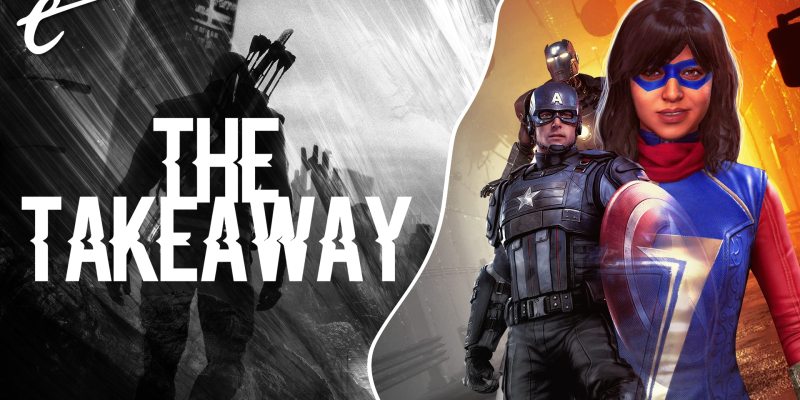How much time should we give a video game after it’s released in order for it to reach its full potential? This is a question that I’ve been thinking about a lot lately, spurred by different recent examples. Some games have grown impressively after their initial launch, while others we are simply hoping will someday go through this chrysalis and emerge a bigger, better experience.
On one end of the spectrum we have Sea of Thieves, which just last week won a BAFTA for Best Evolving Game, three years after its initial release. Through its positive community, strong support from Rare, a leap onto PC, and its eventual place on Game Pass, Sea of Thieves has come a long, long way from where it was at launch, with its most active month ever coming last summer.
On the other end of the spectrum we have Marvel’s Avengers, a game that is slowly morphing into a more enjoyable experience than it was back at launch last September, but the rate of that transformation may not be fast enough to sustain the player base for the long haul. Despite the new-gen version finally releasing and the Black Panther tease looking pretty neat, the release of Hawkeye in the game landed with a resounding thud. Crystal Dynamics’ roadmap for the future of the game doesn’t seem to invite enough excitement and expectation to keep players engaged or, more importantly, draw in new players. It’s hard not to look at the game and wonder if it will close up shop in the way EA and BioWare sent Anthem off into the sunset.

At the same time we have Cyberpunk 2077, which was released just over 100 days ago and is still unavailable on the PlayStation 4 or PlayStation 5 digital stores. I have so much empathy for the talented developers at CD Projekt who were forced by the powers that be to release the game prematurely in its messy state (especially on last-gen hardware) and whose plans to fix those issues post-launch were interrupted by a heavy ransomware hack on the company.
But between the launch woes of Cyberpunk 2077 and Marvel’s Avengers, two games that felt like they were slam dunks a year ago, it makes sense why so many more publishers and developers are choosing to push their games back well past their initial targeted dates. Halo Infinite was the big one from last fall that slipped, which was absolutely the correct move given the game’s rocky gameplay reveal and the subsequent refreshingly open dialogue that the 343 team has had regarding its development. And while obviously the pandemic has had a seismic impact on the industry as a whole, you have to believe that WB Montreal was paying close attention to those two games when it decided to delay Gotham Knights into next year.
When I think about some of the biggest turnaround success stories of the past decade that reached their full potential, alongside Sea of Thieves I look at games like Warframe, Star Wars Battlefront II, No Man’s Sky, Rainbow Six Siege, and Final Fantasy XIV. These are games that are nearly unrecognizable from the form in which they originally launched. Through a dedicated team that was tapped into what fans wanted, they were able to change the experience with incremental updates and sometimes massive overhauls like we saw with A Realm Reborn. It also helped that some of these games either became free to play or were offered for free via various console and PC-centric programs like Game Pass and PlayStation Plus. Being able to draw in an audience is the first step towards keeping these experiences alive and thriving, and it’s something that games like Evolve, Battleborn, and the aforementioned Anthem simply weren’t able to do.

It’s interesting to see certain deals being made prior to release to help ensure that an initial player base is there at launch, the most notable of these being Outriders debuting on Xbox Game Pass at launch. This deal not only helps boost the visibility of Outriders, but it also helps strengthen Microsoft’s service as a must-have for Xbox owners. We saw similar success stories with Rocket League and Fall Guys, both of which were on PlayStation Plus at launch. However, this isn’t a surefire solution, as is evident with Destruction AllStars, which debuted on the service in February and seems to be garnering very little conversation two months later.
At the end of the day, it’s hard to say how much time should be given for a game to grow and reach its full potential after its initial launch. Money rules everything in this industry, and we don’t have a clear picture of what the inner workings of these studios are like and what projects on the horizon could benefit from a shift in resources. If there were some magical formula that a troubled launch could follow and ultimately become a success story, every game would adhere to that path. But sometimes, no matter how much potential there might be or how many resources a studio or publisher might have, an experience simply isn’t salvageable.
I’m not saying that Marvel’s Avengers is a lost cause. So many of the aforementioned success stories hit lower lows at some point in their life cycles. Plus, I’ve already put over 100 hours into the game, so clearly it’s doing something right for me. But while the future is certainly unknown, it’s remarkable to see a group of ragtag pirates succeed where Earth’s mightiest heroes stumble.
